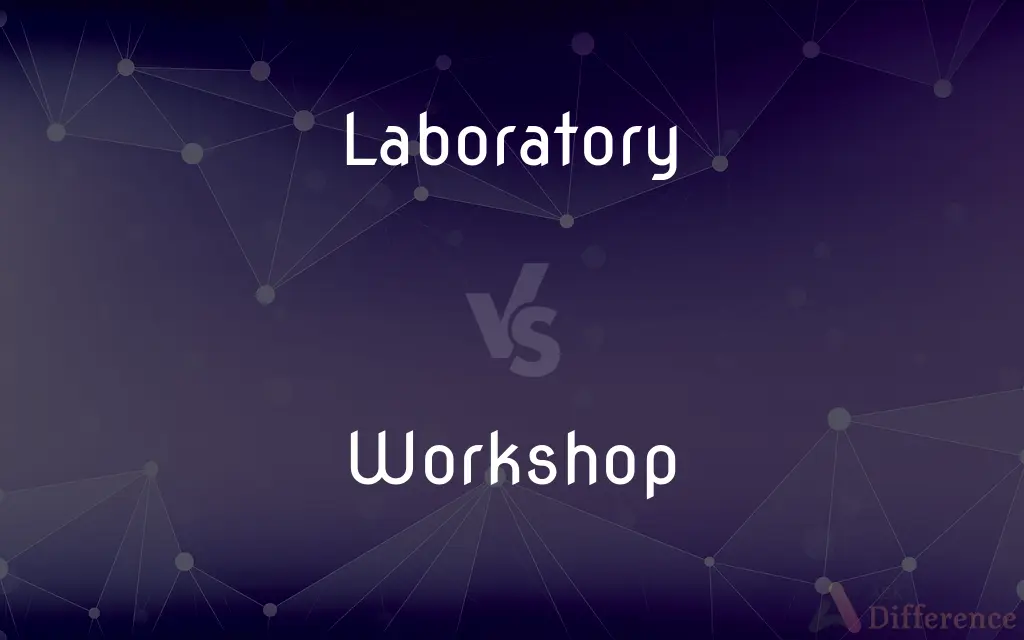Laboratory vs. Workshop — What's the Difference?
By Urooj Arif & Fiza Rafique — Updated on March 28, 2024
Laboratory refers to a controlled environment designed for scientific research, experiments, and measurements, whereas workshop denotes a space for building, fixing, or creating things, often involving hands-on work.

Difference Between Laboratory and Workshop
Table of Contents
ADVERTISEMENT
Key Differences
Laboratories are specialized facilities equipped with scientific instruments and equipment to conduct experiments, tests, and research in various scientific fields such as biology, chemistry, and physics. These environments are designed to maintain strict standards of cleanliness, safety, and control, enabling precise scientific work. For instance, a chemistry lab is equipped with beakers, Bunsen burners, and safety gear to conduct chemical reactions under controlled conditions. On the other hand, workshops are spaces equipped with tools and machinery for woodworking, metalworking, or other crafts and trades. Workshops focus on the practical application of skills to create, build, or repair items, ranging from furniture in a woodworking shop to cars in an automotive shop.
While laboratories emphasize scientific research and the pursuit of knowledge, workshops center on craftsmanship, skill development, and the production or repair of physical objects. A laboratory might be where new medicines are developed through rigorous testing and analysis, whereas a workshop could be where an artisan crafts furniture or a mechanic repairs vehicles.
In terms of atmosphere, laboratories are often characterized by a sterile, controlled environment crucial for experimental accuracy and safety. Workshops, however, may embrace a more rugged or industrial atmosphere, with emphasis on hands-on activities and the physical manipulation of materials. Safety is a key concern in both settings, though the nature of risks and the protective measures taken can differ significantly.
Educationally, laboratories provide students and researchers a place to apply scientific theories, conduct experiments, and gain firsthand experience with scientific phenomena and processes. Workshops serve as training grounds for practical skills, offering a space to learn and apply techniques in woodworking, metalworking, automotive repair, and other crafts.
While laboratories and workshops are both specialized spaces designed for specific types of work, their purposes, equipment, and atmospheres differ significantly, reflecting the distinction between scientific research and practical craftsmanship.
ADVERTISEMENT
Comparison Chart
Primary Purpose
Scientific research, experiments, and measurements.
Building, fixing, or creating physical objects.
Environment
Controlled, clean, and sterile for precision.
Rugged, industrial, hands-on for crafting and repairs.
Equipment
Scientific instruments and equipment for experiments.
Tools and machinery for crafting, building, and repairing.
Focus
Pursuit of scientific knowledge and analysis.
Practical application of skills and craftsmanship.
Safety Concerns
Chemical, biological, and physical hazards.
Mechanical, physical, and sometimes chemical hazards.
Compare with Definitions
Laboratory
Characterized by a sterile environment necessary for precise experimental work.
The lab technician prepared the sterile environment before beginning the experiment.
Workshop
A place for creative exploration and building.
Artists and makers gathered in the workshop to share techniques and collaborate on projects.
Laboratory
A facility equipped for scientific experiments, research, or teaching.
The research team spent hours in the laboratory analyzing the sample.
Workshop
Can be specialized, such as an automotive or carpentry workshop.
The automotive workshop was equipped to handle all types of car repairs.
Laboratory
Emphasizes safety and accuracy in scientific endeavors.
Laboratory protocols must be strictly followed to ensure accurate results.
Workshop
A space equipped with tools for woodworking, metalworking, or other crafts.
He spent his weekends crafting furniture in his workshop.
Laboratory
Specialized according to the field of study, such as a biology or physics lab.
The university's physics laboratory had advanced particle accelerators.
Workshop
Often has a rugged or industrial atmosphere suited to practical tasks.
The workshop was filled with the sounds of saws and hammers at work.
Laboratory
A place for developing new technologies or medicines.
The new drug was formulated in the pharmaceutical laboratory.
Workshop
Focuses on hands-on work and skill application.
The community workshop offered classes in ceramics and metalworking.
Laboratory
A laboratory (UK: , US: ; colloquially lab) is a facility that provides controlled conditions in which scientific or technological research, experiments, and measurement may be performed. Laboratory services are provided in a variety of settings: physicians' offices, clinics, hospitals, and regional and national referral centers.
Workshop
Beginning with the Industrial Revolution era, a workshop may be a room, rooms or building which provides both the area and tools (or machinery) that may be required for the manufacture or repair of manufactured goods. Workshops were the only places of production until the advent of industrialization and the development of larger factories.
Laboratory
A room or building equipped for scientific experimentation or research.
Workshop
A room, area, or small establishment where manual or light industrial work is done.
Laboratory
An academic period devoted to work or study in such a place.
Workshop
An educational seminar or series of meetings emphasizing interaction and exchange of information among a usually small number of participants
A creative writing workshop.
Laboratory
A place where drugs and chemicals are manufactured.
Workshop
To create or revise (a drama or literary work) based on suggestions or criticism from a group of collaborators.
Laboratory
A place for practice, observation, or testing.
Workshop
A room, especially one which is not particularly large, used for manufacturing or other light industrial work.
Laboratory
A room, building or institution equipped for scientific research, experimentation or analysis.
Workshop
A brief, intensive course of education for a small group, emphasizing interaction and practical problem solving.
Laboratory
A place where chemicals, drugs or microbes are prepared or manufactured.
Workshop
An academic conference.
Laboratory
The workroom of a chemist; also, a place devoted to experiments in any branch of natural science; as, a chemical, physical, or biological laboratory. Hence, by extension, a place where something is prepared, or some operation is performed; as, the liver is the laboratory of the bile.
Workshop
(transitive) To help a playwright revise a draft of (a play) by rehearsing it with actors and critiquing the results.
Laboratory
Any place, activity or situation suggestive of a scientific laboratory{1}, especially in being conducive to learning new facts by experimentation or by systematic observation; as, the states serve as laboratories where different new policies may be tested prior to adoption throughout the country.
Workshop
(transitive) To work on or revise something, especially collaboratively, in a workshop.
Laboratory
A workplace for the conduct of scientific research
Workshop
To improve through collaboration.
Laboratory
A region resembling a laboratory inasmuch as it offers opportunities for observation and practice and experimentation;
The new nation is a testing ground for socioeconomic theories
Pakistan is a laboratory for studying the use of American troops to combat terrorism
Workshop
A shop where any manufacture or handiwork is carried on.
Workshop
Small workplace where handcrafts or manufacturing are done
Workshop
A brief intensive course for a small group; emphasizes problem solving
Common Curiosities
Is safety equipment required in workshops?
Yes, safety equipment such as goggles, gloves, and ear protection is often required in workshops to protect against injuries from tools and machinery.
Can someone work in both a laboratory and a workshop?
Yes, professionals like engineers, designers, and scientists may work in both settings, depending on the nature of their projects and the skills required.
Can workshops be used for scientific purposes?
While workshops are typically associated with craftsmanship and repairs, they can also be adapted for scientific projects that require construction or engineering work.
Are laboratories only found in scientific research institutions?
Laboratories are common in research institutions, universities, and hospitals, but they can also be found in industries like pharmaceuticals, manufacturing, and technology.
How do educational institutions incorporate workshops and laboratories?
Educational institutions use laboratories for teaching scientific principles and experiments, while workshops are used for teaching practical skills and crafts.
Can workshops be considered creative spaces?
Yes, workshops are often seen as creative spaces where individuals can design, experiment, and create unique items or art.
What is the importance of maintaining a controlled environment in laboratories?
A controlled environment in laboratories ensures that experiments are not contaminated and that results are accurate and reproducible.
Is there a community aspect to workshops?
Workshops often foster a sense of community among craftsmen, hobbyists, and learners, sharing skills, ideas, and collaborating on projects.
Can the principles of design be applied in a laboratory setting?
While design principles are more commonly associated with workshops and the creation of physical objects, they can also influence the layout and functionality of laboratories.
How do advancements in technology affect workshops and laboratories?
Technological advancements introduce new tools, equipment, and methodologies, enhancing the capabilities, safety, and efficiency of both workshops and laboratories.
Are there similarities between laboratories and workshops?
Both are specialized environments equipped for specific types of work, emphasizing safety, skill development, and the application of knowledge.
How do environmental concerns impact laboratories and workshops?
Both face increasing pressure to adopt sustainable practices, manage waste responsibly, and minimize environmental impact.
What role do laboratories play in public health?
Laboratories are crucial for diagnosing diseases, researching medical treatments, and monitoring public health threats.
How does one choose between a career in a laboratory or a workshop?
Career choice depends on personal interests, whether one is drawn to scientific inquiry and research or prefers hands-on crafting, building, and repair work.
How do workshops contribute to local economies?
Workshops contribute by producing goods, providing repair services, and offering skills training, supporting employment and local craftsmanship.
Share Your Discovery

Previous Comparison
Enabler vs. Disabler
Next Comparison
Enquire vs. QueryAuthor Spotlight
Written by
Urooj ArifUrooj is a skilled content writer at Ask Difference, known for her exceptional ability to simplify complex topics into engaging and informative content. With a passion for research and a flair for clear, concise writing, she consistently delivers articles that resonate with our diverse audience.
Co-written by
Fiza RafiqueFiza Rafique is a skilled content writer at AskDifference.com, where she meticulously refines and enhances written pieces. Drawing from her vast editorial expertise, Fiza ensures clarity, accuracy, and precision in every article. Passionate about language, she continually seeks to elevate the quality of content for readers worldwide.















































